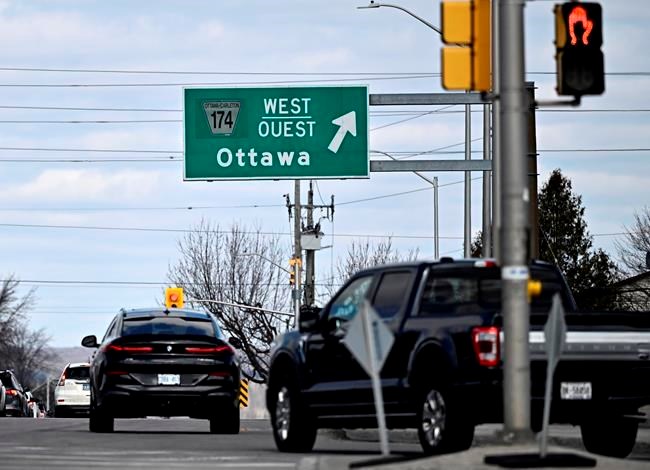Ontario has reached a "new deal" with the City of Ottawa that will see the province take over certain major costs in exchange for the municipality encouraging more housing development and minimizing taxation.
The province announced Thursday that it will take over ownership of Highway 174, support the repairs of major connecting roads and open a new police station downtown.
"We're announcing a new deal for Ottawa that will help the city continue rebuilding the economy and deliver on key priorities, including building highways and homes," Premier Doug Ford said in Ottawa at a breakfast chat with Mayor Mark Sutcliffe.
Ford said the deal reflects the city’s unique position as the country’s capital and eastern Ontario’s economic engine.
The province will give the city $546 million in a 10-year deal to help its economic recovery and revitalization. Ford said some of the money will also go toward hiring more police officers.
"This is a big win for Ottawa," Sutcliffe said.
The funding will "relieve significant budget pressures" and allow for the delivery of better services to residents, the mayor said.
A tranche of money will also go toward conditional funding for emergency shelters, the design and construction of an interchange on Highway 416 in the suburbs, and a transitway.
Ontario said the city has made a number of "reciprocal commitments" to the province, including opening up land for housing development, strengthening the vacant home tax and minimizing taxation.
Ford and Sutcliffe also called on the federal government to "do its part to help revitalize the downtown economy."
In particular, the premier called on the federal government to have its workforce return to the office for more days per week.
"They have to get people back to work," Ford said. "Even like three days, anything. It sounds crazy: I'm begging people to go to work for three days, not that they aren't working at home, but it really affects that downtown."
Last fall, Ford announced a deal with the City of Toronto that saw the province take over ownership and operational costs of two highways as the city faced a $1.5-billion shortfall for 2024.
The province taking responsibility for those highways, along with a promise to fund 55 new subway trains — conditional on a matching federal contribution — is set to give Toronto $7.6 billion in capital relief.
The province also gave Toronto up to $1.2 billion in operating funding over three years, including support for two light rail lines, money for transit operations and for more homeless shelters.
As part of that deal, Toronto Mayor Olivia Chow capitulated on the issue of Ontario Place.
During the mayoral election campaign, she pledged to fight Ford's plan to redevelop the waterfront attraction that will see a massive spa, new marina, redeveloped pods, a new concert venue and new beaches built. Chow relented because the city only owned a sliver of land that the province could have expropriated.
Ford said both Ottawa and Toronto have "unique" challenges that necessitated a new deal, but he said similar deals for other cities aren't in the offing because the province "pours money" into other municipalities across the province.
Ontario's Big City Mayors, which represents the mayors of 29 cities with a population over 100,000, welcomed the deal for Ottawa.
"This new deal shows that the province recognizes that Ontario’s biggest cities are in need of significant new funding outside of the municipal tax base," said Marianne Meed Ward, the mayor of Burlington and chair of the big city mayors.
But the organization is pushing for new deals for other Ontario cities as well.
The mayors said municipal taxpayers are subsidizing the province to the tune of $4 billion per year to pay for infrastructure and services that are the Ontario government's responsibility.
“We want to work together to create a new deal for all cities that will help Ontario municipalities grow and thrive for years to come," Meed Ward said.
New Democrat finance critic Catherine Fife said while the NDP is happy for the deal with Ottawa, the rest of the municipalities in the province have said they want to be made whole.
"This government has some inner reflection to do when they look at how they've hurt municipalities and how they hurt the people of this province, particularly on the housing file," she said.
Liberal Party parliamentary leader John Fraser, who represents an Ottawa riding, said Ottawa got shortchanged compared to the deal with Toronto.
"If you look at it on a per-capita basis, it doesn't compare," Fraser said.
This report by The Canadian Press was first published March 28, 2024.
Liam Casey, The Canadian Press


